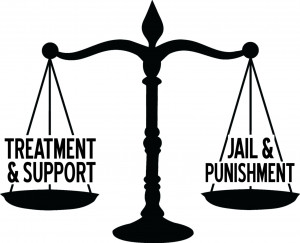
(12-11-20) FROM MY FILES FRIDAY: Cynthia Kemp, a deputy director at the Substance Abuse and Mental Health Services Administration, told attendees at a mental health summit two years ago how Arlington County, Va., created a jail diversion program that now is considered one of the best in the nation. Her advice is worth reading.
How To Launch A Jail Diversion Program In YOUR community
“Begin by finding a champion,” Cynthia Kemp told the 300 community leaders, who were invited by Louisiana Senator Bill Cassidy (R.) to a Louisiana Mental Health Summit in Baton Rogue. (A short news clip where both Sen. Cassidy and I are interviewed can be watched here.)
Kemp said it could be a judge, sheriff, police chief, state legislator, mayor – anyone who understands that locking up people who are sick is a waste of tax dollars and human potential.
Step Two: Hit the streets. Talk to the police to learn what problems they face because of persons with mental illnesses becoming entrapped in the criminal justice system. The National Alliance on Mental Illness reports that 40% of persons with a serious mental illness will have an encounter with the police. By some estimates, as high as 49% of all fatal police shootings involve someone with a mental illness. Advocates must also speak with public defenders, judges, prosecutors, local mental health providers, parents and persons with lived experience – and identify what barriers they have encountered preventing individuals from getting community mental health care.
Step three: Compile your data. How many people with mental illnesses are in your local jail? How much does it cost to keep them there? What does the jail pay for medications? How long do persons with mental illness, who are arrested, stay in jail compared to others charged with identical crimes? (Nationally, twice as long.)
Step four: Set The Table: After you compile your data, get everyone in the same room and use what you have learned to formulate a jail diversion plan. Buy a large piece of paper and draw three vertical lines. In the first column, write down the problems that you have discovered during your talks. In the second, list possible solutions. In the third column, write down a schedule for when those solutions will be implemented.

Cynthia Kemp
Kemp said the police in Arlington complained about long waits at emergency rooms that kept them from returning to their patrol duties. “It’s faster to simply book them in jail,” an officer told her. The solution: coming up with an innovative way to transfer custody at a mental health facility to help officers return to their patrols within minutes.
Kemp said solutions often don’t cost much. Arlington judges expected prisoners to appear in court, but that required having officers transport defendants from hospitals to the courthouse. Sometimes, when they returned, their beds already had been given to someone else in crisis. The solution: holding involuntary commitment hearings inside the hospital, guaranteeing that those who were committed kept their rooms and reducing the cost of transporting defendants and the personnel needed to accompany them.
Step five: Time to Implement. Begin putting your plan into action.
Step six: Accountability. Make certain through weekly or monthly meetings that goals are being met and your plan is working. If not, adapt. Make certain you are getting the outcomes that you want.
Step seven: Celebrate your successes! Congratulate those who are working to implement jail diversion.
Those were Kemp’s seven common sense steps to success.
I would add an eighth.
Step eight: Don’t give up. Lives are at stake. Our loved ones’ lives. Be resilient. Kemp said it took her team ten years before it was finally able to open a crisis drop off center where people could be taken rather than a jail or prison.
The Stepping Up Initiative is a national campaign to get local governments to implement jail diversion. Ruby Qazibash, associate deputy director at the Bureau of Justice Assistance, told attendees at the summit that more than 450 counties have signed Stepping Up pledges. There are 3,300 counties in the U.S.. The good news is that 40% of the U.S. population lives in jurisdictions where leaders have agreed to implement Stepping Up. You should check the website to learn if your county is on board. If not, start calling your local officials to encourage them to adopt the initiative.
Sen. Cassidy is a model of a committed “champion,” who is working to improve our broken system. Along with Sen. Chris Murphy, (D.-Conn.) and former Rep. Tim Murphy (R-Pa.) Cassidy helped write and pass the most comprehensive mental health reform bill signed into law in recent memory.
Sen. Cassidy is proof that when a “champion” gets involved, reforms can happen.
Several Louisiana television stations covered yesterday’s summit.
A story about the summit.
Building a better system for mental health treatment
Louisiana Mental Health Summit in Baton Rouge aims to create networks of care in communities by Jennifer Crockett
Mental health experts from across the country spent the day in Baton Rouge Tuesday trying to figure out how to build a network of mental health services that works. The Louisiana Mental Health Summit was hosted by U.S. Sen. Bill Cassidy, who represents Louisiana.
“We are trying to build a network and create awareness of opportunity,” Cassidy said. He said getting people help when they are in a mental health crisis reduces the burden on the criminal justice system.
“Forty percent of those who are mentally ill interact with the criminal justice system, and I’d never thought about the cost associated with that – the booking fee, the time that the officer is not on the streets arresting bad folks but rather sitting as someone who’s mentally ill is there,” Cassidy said.
Dr. Joshua Gordon, a psychiatrist and neuroscientist, participated in a panel on the federal role in mental health treatment. As director of the National Institute of Mental Health, Gordon researches effective ways to coordinate mental health care.
“A comprehensive approach to treating individuals can be really, really helpful,” Gordon said. “We often think, ‘Oh, there’s nothing we can do.’ But actually, we’ve shown that if you get together your psychiatrist, your therapist, employment counselors, primary care doctors, you can make a huge difference, and people can lead really productive lives despite a serious mental illness.”
Author Pete Earley spoke at the summit about the pain and frustration that families go through when a loved one suffers from mental illness. He wrote the book “Crazy: A Father’s Search Through America’s Mental Health Madness,” after his son suffered a psychotic break while in college. The book was a Pulitzer Prize finalist in 2007. He said his son is doing great now and getting the help he needs. But he said finding that help wasn’t easy.
“First of all, you need to know if you have a police department with Crisis Intervention Team (CIT) trained officers,” Earley said. “You don’t want Rambo coming through the door, and luckily lots of sheriffs here today are heads up on that. Second of all, you want to know if your person can be diverted through a problem solving court into treatment. Why arrest someone like my son who his biggest crime was he got sick? Let’s get into treatment centers.”
New Orleans has a Mental Health Court and in St. Tammany Parish there is a Behavioral Heath Court to get help for people with mental illness who are stuck in the judicial system. Multiple law enforcement agencies in Southeast Louisiana also have CIT trained officers.
St. Tammany Parish was pointed out as a model during the talks for its work on addressing high rates of mental illness and addiction.
Parish President Pat Brister said that the former Southeast Mental Hospital near Mandeville is being transformed into a Safe Haven campus, with new services opening early next year.
Transforming the southeast mental hospital into the safe haven campus
“We have some services already, and we have others that some that will be opening in the first quarter of 2019,” Brister said.
The panel also praised the National Alliance on Mental Illness’ work in the region to provide community resources to people with mental illness.



